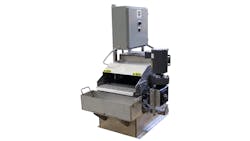Magnetic Filter Finds Fines, Smoothes Process
When the kitchen drain is clogged and the plunger doesn't help, it’s time to call the plumber. The plumber will examine the situation, snake out the drain line to remove the clog, and solve the problem. An experienced professional can restore the kitchen's function in about an hour.
But not all plugs are alike. When a manufacturer suspects that a drilling operation could cause plugs inside a precision brake component, he knows that the resulting damage will be more costly and require greater action than a phone call. That's why manufacturing engineer Jim Helpling of Harco Brake Components sought a novel solution when he was assigned to make a new steel brake fitting he knew would be prone to plugs caused by metal-laden coolants.
A veteran of 20 years in manufacturing, Helpling’s assignment was the complete fabrication of Harco's new steel component. His responsibilities ranged from overseeing the initial part design through development and implementation of machining the components, or, as Helpling said, "Anything to do with making the part, to designing the part, to selecting the tooling."
Laced with tiny (0.15 in.) internal drilled precision holes created by high-performance drills, these parts were to be produced with extremely fast cycle times. Critical components like brake fittings must be flawless. Harco could not risk that this component might be less than perfect.
Clean coolant is critical
Clean coolant would be the key to the success of this drilling operation. The formulation not only keeps the parts cool, but it also washes away the fines produced by the drills. Any fines not removed from the parts' small, internal machined holes could lodge inside the component and damage its surface — and function.
"If you get contaminants in your coolant, you plug your (part) holes," Helpling summarized. Clean coolant also increases tool life, which keeps tooling costs in line with the projected budget and reduces tool changes and associated downtime.
Helpling knew that the operation would produce fines that wouldn't be caught by traditional micron filters. Fines remaining in the small, internal machined holes would eventually cause the drill bit to break. With replacements at $100 per bit, these breaks are to be avoided, but the greater risk of damaged tooling lies in producing a defective part that might not be discovered until inspection.
Because metal-free cooling is critical to this project, Helpling looked toward magnetic filtration as a solution. Magnetic Products Inc.'s Del Butler visited the Harco plant in Moraine, Ohio, and suggested MPI's Eco-Flow.
MPI develops and supplies magnetic and non-magnetic material handling solutions. It engineers magnetic equipment and informs customers by way of its R&D investments and proactive product training.
Continuous cleaning
MPI’s Eco-Flow system is a continuous-cleaning magnetic separator that keeps coolants free of metal fines and other contaminants. By eliminating the cartridge filter, Harco would not have to worry about clogged filters, costly replacement filters, or machine downtime.
As the Eco-Flow removes fines, fluids are automatically fed back into the integrated reservoir tank. An extremely dry “fine cake” is produced. This drier cake means fewer messy, oily pools around machinery, and improved coolant recovery, reducing fluid replacement costs. The Eco-Flow is “green,” and it eliminates the need for paper filters that normally end up in landfills.
Also, an automatic coolant level sensor monitors the volume of incoming coolant to avoid choking and human error, while an overflow bypass eliminates potential spills in case of electrical or mechanical failure.
Helpling said the Eco-Flow start-up was simple and event-free. "I connected it to the outlet and it started running,” he recalled. “I haven't had to touch it since the day it was installed. No tweaks. No nothing. Not one issue. The Eco-Flow is doing the job."
